- Equal Pay for Equal Work: The Council on Contemporary families offers aportfolio of research on 50 years since the Equal Pay Act, and we suggest checking out the pieces on how the wage gap narrows among high earners and how the wage gap is affected by race and ethnicity.
- Awareness of Diseases like ALS and Alzheimer’s: A 2012 American Sociological Review article by Rachel Kahn Best outlines how awareness campaigns bring more funding to medical research on some conditions, but add to the stigma associated with others.
- Voting Rights: The Scholars Strategy Network presents an overview of research on steps forward and back since the Voting Rights Act of 1963.
- Mass Incarceration: Sarah Shannon and Chris Uggen offer a starting point with their time-lapse visualizations of changes in American punishment, including the disproportionate incarceration of black men.
democracy
At last night’s Oscars, social issues were center stage. Below, four of the issues award winners touched on and some starting points for learning more:
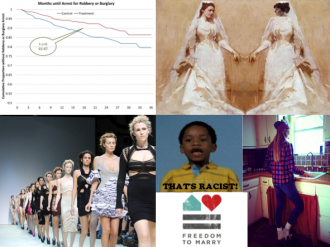
Sign up for TSP’s mailing list, and get the Friday Roundups sent right to your inbox!
This week on The Society Pages, we tackled drug addiction and harm reduction, body image and stigma, Twitter as a public forum for shaming, marriage equality and health, and the thin line between The Bachelor‘s Juan Pablo and Duck Dynasty‘s Phil Robertson. Plus much more (as always)!
Sign up for the new Friday Roundup Newsletter!
From Sport to Voting Rights
This week The Society Pages checked out gender stereotyping and toys, how we communicate our tone online (but really don’t want to talk on the phone), a whole collection of photoshop in the media, fatherhood and race, and we learned a thing or two from our Nordic friends. Enjoy! more...
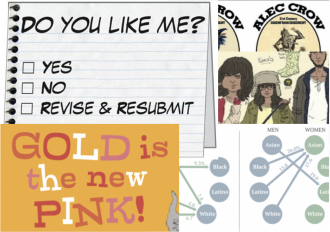 This week we played around with #socgreetings, got excited to see movers and shakers talking about the We Are All Criminals project, and mourned rabble-rousing change-maker Nelson Mandela while hoping those he inspired would continue bending the arc of history… and society. Here’s what else we got up to. more...
This week we played around with #socgreetings, got excited to see movers and shakers talking about the We Are All Criminals project, and mourned rabble-rousing change-maker Nelson Mandela while hoping those he inspired would continue bending the arc of history… and society. Here’s what else we got up to. more...
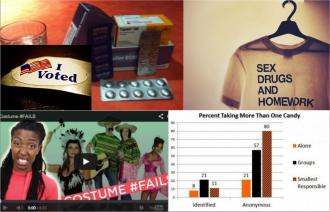 At a Loss
At a Loss
The Society Pages is housed, as many of you know, at the University of Minnesota, and stems from a vision Doug Hartmann and Chris Uggen formulated in their term as the editors of the ASA’s journal Contexts. That vision was also shaped by the young sociologists who made up the graduate editorial board of Contexts for each of its four years at the U of M, and later when it came to creating and sustaining The Society Pages. It’s now been a week since we lost one of those bright young minds: Tim Ortyl. I still don’t know what to say, other than that Tim did everything in his life whole-heartedly, and so I’m pleased that you can read some of his work here on our site, as well as a Contexts article that SAGE publications and the ASA are offering as a free download. I believe Tim had contributed immensely to the discipline already, and I hope that having known him as a friend, teacher, colleague, or student will continue to inspire sociological imaginations long after our quiet time of mourning fades. Right now, that time seems impossible. more...
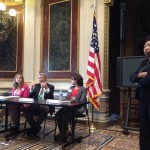 I was surprised to receive an invitation to speak at the White House this August, as part of a parental incarceration workshop sponsored by the American Bar Foundation and National Science Foundation. Though I’d written a bit on the subject and had followed the research closely for a decade, I could not claim any great expertise. Fortunately, they didn’t need me for that. They’d already assembled an impressive roster of experts to speak on topics such as demography and family dynamics, behavioral and health problems, education and exclusion, justice policy, and caring for children. My job, according to the draft agenda, was to offer “concluding comments” in the final half-hour session. Or, as John Hagan put it, “Just do what you do.”
I was surprised to receive an invitation to speak at the White House this August, as part of a parental incarceration workshop sponsored by the American Bar Foundation and National Science Foundation. Though I’d written a bit on the subject and had followed the research closely for a decade, I could not claim any great expertise. Fortunately, they didn’t need me for that. They’d already assembled an impressive roster of experts to speak on topics such as demography and family dynamics, behavioral and health problems, education and exclusion, justice policy, and caring for children. My job, according to the draft agenda, was to offer “concluding comments” in the final half-hour session. Or, as John Hagan put it, “Just do what you do.”
Riiiiight. Do what I do.
Well, I couldn’t just come out and ask what I do, so I decided to do TSP. more...
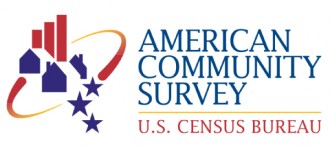 Under the title “Know Thyself, America,” Washington Post columnist George Will wrote a piece a little over a week ago that advocated for the continued support of the American Community Survey (ACS), an ongoing, long-form supplement to the decennial U.S. Census.
Under the title “Know Thyself, America,” Washington Post columnist George Will wrote a piece a little over a week ago that advocated for the continued support of the American Community Survey (ACS), an ongoing, long-form supplement to the decennial U.S. Census.
This shouldn’t seem like a particularly significant or controversial issue, but for those who fear the intrusion of government into any and all aspects of social life, it apparently is. more...

Sign up for TSP’s mailing list, and get the Friday Roundups sent right to your inbox!
This week on The Society Pages, we tackled drug addiction and harm reduction, body image and stigma, Twitter as a public forum for shaming, marriage equality and health, and the thin line between The Bachelor‘s Juan Pablo and Duck Dynasty‘s Phil Robertson. Plus much more (as always)!
Sign up for the new Friday Roundup Newsletter!
From Sport to Voting Rights
This week The Society Pages checked out gender stereotyping and toys, how we communicate our tone online (but really don’t want to talk on the phone), a whole collection of photoshop in the media, fatherhood and race, and we learned a thing or two from our Nordic friends. Enjoy! more...
 This week we played around with #socgreetings, got excited to see movers and shakers talking about the We Are All Criminals project, and mourned rabble-rousing change-maker Nelson Mandela while hoping those he inspired would continue bending the arc of history… and society. Here’s what else we got up to. more...
This week we played around with #socgreetings, got excited to see movers and shakers talking about the We Are All Criminals project, and mourned rabble-rousing change-maker Nelson Mandela while hoping those he inspired would continue bending the arc of history… and society. Here’s what else we got up to. more...
 At a Loss
At a Loss
The Society Pages is housed, as many of you know, at the University of Minnesota, and stems from a vision Doug Hartmann and Chris Uggen formulated in their term as the editors of the ASA’s journal Contexts. That vision was also shaped by the young sociologists who made up the graduate editorial board of Contexts for each of its four years at the U of M, and later when it came to creating and sustaining The Society Pages. It’s now been a week since we lost one of those bright young minds: Tim Ortyl. I still don’t know what to say, other than that Tim did everything in his life whole-heartedly, and so I’m pleased that you can read some of his work here on our site, as well as a Contexts article that SAGE publications and the ASA are offering as a free download. I believe Tim had contributed immensely to the discipline already, and I hope that having known him as a friend, teacher, colleague, or student will continue to inspire sociological imaginations long after our quiet time of mourning fades. Right now, that time seems impossible. more...
 I was surprised to receive an invitation to speak at the White House this August, as part of a parental incarceration workshop sponsored by the American Bar Foundation and National Science Foundation. Though I’d written a bit on the subject and had followed the research closely for a decade, I could not claim any great expertise. Fortunately, they didn’t need me for that. They’d already assembled an impressive roster of experts to speak on topics such as demography and family dynamics, behavioral and health problems, education and exclusion, justice policy, and caring for children. My job, according to the draft agenda, was to offer “concluding comments” in the final half-hour session. Or, as John Hagan put it, “Just do what you do.”
I was surprised to receive an invitation to speak at the White House this August, as part of a parental incarceration workshop sponsored by the American Bar Foundation and National Science Foundation. Though I’d written a bit on the subject and had followed the research closely for a decade, I could not claim any great expertise. Fortunately, they didn’t need me for that. They’d already assembled an impressive roster of experts to speak on topics such as demography and family dynamics, behavioral and health problems, education and exclusion, justice policy, and caring for children. My job, according to the draft agenda, was to offer “concluding comments” in the final half-hour session. Or, as John Hagan put it, “Just do what you do.”
Riiiiight. Do what I do.
Well, I couldn’t just come out and ask what I do, so I decided to do TSP. more...
 Under the title “Know Thyself, America,” Washington Post columnist George Will wrote a piece a little over a week ago that advocated for the continued support of the American Community Survey (ACS), an ongoing, long-form supplement to the decennial U.S. Census.
Under the title “Know Thyself, America,” Washington Post columnist George Will wrote a piece a little over a week ago that advocated for the continued support of the American Community Survey (ACS), an ongoing, long-form supplement to the decennial U.S. Census.
This shouldn’t seem like a particularly significant or controversial issue, but for those who fear the intrusion of government into any and all aspects of social life, it apparently is. more...

